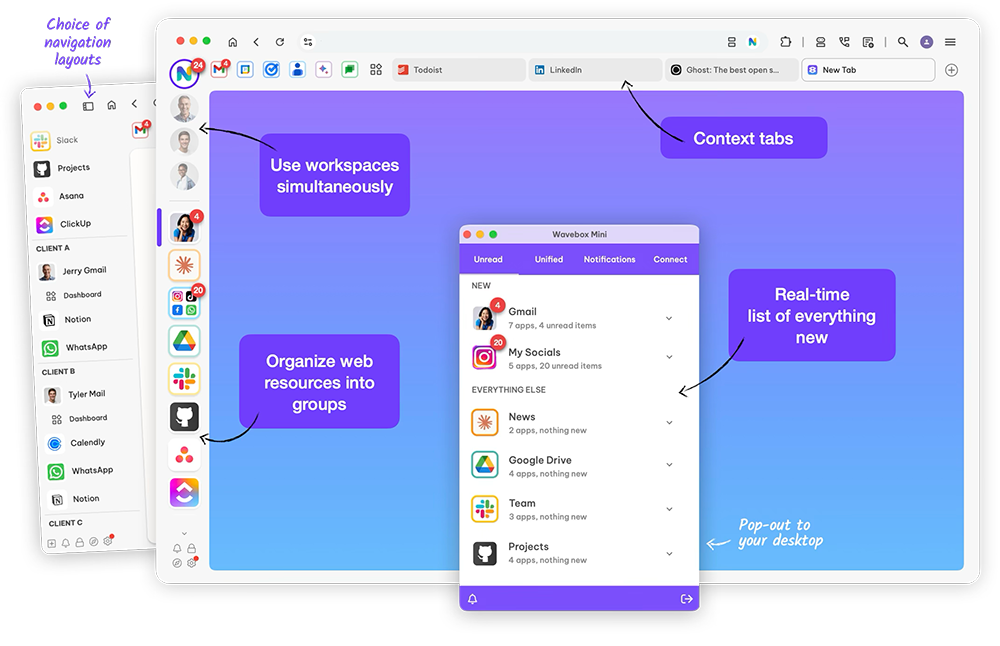A comparison of 10 of the most trusted Virtual Private Network (VPN) providers available in 2025. Each VPN listed here has been selected based on verifiable features, including independently audited zero-logs policies, global server availability, connection speeds, and the availability of advanced privacy tools. Whether you're looking for a VPN to help you browse securely on public Wi-Fi, protect your online identity, or unlock region-restricted content, this guide provides a side-by-side comparison of the best options currently available.
In a digital world where surveillance, data collection, and cybercrime are more prevalent than ever, Virtual Private Networks (VPNs) have become increasingly essential tools for protecting your online activity. Whether you're working remotely, travelling abroad, accessing sensitive information, or simply browsing the web, a reliable VPN shields your data from prying eyes, including governments, advertisers, and even your internet service provider (ISP).
But not all VPNs offer the same level of protection or performance. Choosing the right provider involves more than just finding the cheapest option; it means evaluating:-
- Zero-Logs Policies: Ensures your activity isn't tracked, logged, or stored.
- Speed & Performance: For smooth streaming, video calls, gaming, and downloads.
- Global Server Coverage: Serving more countries and cities means more freedom and access.
- Advanced Features: Kill switches, split tunnelling, ad/tracker blocking, multi-hop routing, RAM-only infrastructure, and more.
This guide is not a ranking of providers from best to worst, but rather a comparison of 10 of the best VPNs based on objective, verifiable criteria to help you choose the right one for your needs.
VPN Comparison Table
10 Best VPNs
1. NordVPN
NordVPN is one of the fastest and most secure VPNs available in 2025. Independently audited by PwC and Deloitte, it operates from Panama and enforces a strict no-logs policy. It uses RAM-only servers and proprietary technology like NordLynx (WireGuard-based) to achieve average real-world speeds of 850–900 Mbps, with peaks close to 950 Mbps. With over 7,000 servers across 111+ countries, features include Threat Protection, Meshnet, and Double VPN, making it an outstanding choice for privacy-focused users who don't want to compromise on speed.
2. ExpressVPN
ExpressVPN continues to lead in global accessibility and consistent performance. Based in the British Virgin Islands, it has passed independent audits and runs exclusively on RAM-only TrustedServer infrastructure. Its proprietary Lightway protocol delivers impressive speed, with recent benchmarks showing 550–600 Mbps average and peaks over 1,600 Mbps in some regions. ExpressVPN operates more than 3,000 servers in 105+ countries and supports features like split tunnelling, DNS leak protection, and a kill switch, ideal for users seeking top-tier reliability across devices.
3. Surfshark
Surfshark offers premium-grade performance at a highly affordable price. Following its 10 Gbps server upgrade in 2024, Surfshark now delivers average speeds of ~200 Mbps and peak speeds up to 1,300 Mbps, depending on server proximity. Audited by Deloitte and based in the Netherlands, Surfshark supports unlimited devices and features RAM-only servers, CleanWeb ad blocking, MultiHop routing, and WireGuard support. It's ideal for families and advanced users who want strong features without breaking the bank.
4. Proton VPN
Proton VPN combines strong privacy protections with respectable speed. Based in Switzerland with open-source apps and an audited no-logs policy, it offers peak speeds of 500–700 Mbps using the WireGuard protocol. However, performance may be ~20% slower than baseline, depending on server load. Standout features include Secure Core multi-hop routing, Tor over VPN, and NetShield for tracker/malware blocking. Proton VPN markets itself as privacy-first and has repeatedly supported activists, dissidents, and journalists around the world through anti-censorship tools, open-source transparency, and crisis-specific initiatives.
5. Mullvad
Mullvad is arguably the most anonymous VPN available; no email is required to sign up, and payments can be made via cash or crypto. With average speeds of 380–400 Mbps and potential peaks around 600–900 Mbps, it's a performance-strong option despite its minimalist branding. Based in Sweden and independently audited, Mullvad supports port forwarding, SOCKS5 proxies, and offers a flat pricing model. Perfect for privacy purists and developers alike.
6. IVPN
IVPN is a transparency-first VPN with a strict no-logs policy and no email required at sign-up. Independently audited and based in Gibraltar, it focuses on privacy over mass-market appeal. However, speeds are modest, testing shows 20–30 Mbps average in controlled conditions, though real-world performance can vary with location and baseline connection. Key features include multi-hop, anti-tracker tools, and WireGuard support. Best for security-focused users who don't prioritise streaming or downloads.
7. Private Internet Access (PIA)
PIA is a long-established VPN with a strong open-source foundation and a proven no-logs policy, verified in court and through third-party audits. With average download speeds of 300–400 Mbps and good reliability on most connections, it's fast enough for streaming and daily use. Upload speeds can dip depending on location. Its feature set includes MACE ad blocker, multi-hop routing, split tunnelling, and full protocol control, making it highly customisable.
8. CyberGhost
CyberGhost is beginner-friendly but feature-rich. Audited by Deloitte and based in Romania, it now operates 10 Gbps servers in central locations, significantly boosting speed and reliability. CyberGhost boasts over 9,000 servers in 100+ countries, many optimised for streaming, and delivers peak speeds of up to 950 Mbps using WireGuard. It includes a kill switch, ad blocker, and split tunnelling, making it great for users new to VPNs who still want excellent performance.
9. TunnelBear
TunnelBear is ideal for newcomers to VPNs. It offers a simple, user-friendly interface backed by annual public audits via Cure53. While speed performance is limited, with typical download speeds under 100 Mbps, especially across long distances, its ease of use and playful branding make it appealing. GhostBear mode can help bypass censorship, and Vigilant Mode acts as a kill switch. TunnelBear is a strong entry-level option for basic privacy protection.
10. Windscribe
Windscribe offers a robust free plan and competitive premium speeds. It claims a no-logs policy (not yet audited) and delivers ~170 Mbps average, with some WireGuard benchmarks peaking at 785 Mbps. Features like R.O.B.E.R.T. blocker, double-hop, and flexible split tunnelling make it attractive to advanced users. While transparency could improve, Windscribe is a solid hybrid VPN for users wanting flexibility and value.
Final Thoughts on VPNs
The right VPN can make all the difference, not just in protecting your privacy but in improving your overall internet experience. Whether you're choosing a VPN for security, streaming, travel, or anonymous browsing, each of these 10 providers offers a unique mix of transparency, performance, and user features.
For the highest levels of privacy, providers like NordVPN, Proton VPN, and Mullvad stand out. For all-around performance with excellent speeds and features, Surfshark, ExpressVPN, and CyberGhost are strong choices.
Remember: A VPN is only as trustworthy as its technology and its track record. Stick with audited, independently verified providers to ensure your data stays yours, no matter where you go online.
Disclaimer: While this guide was accurate at the time of writing, VPN performance and features can change rapidly. Always check the provider's official site for the most current information.










Join in the Discussion